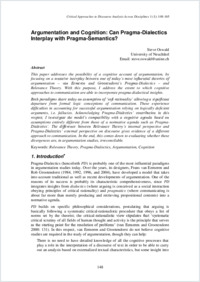Argumentation and Cognition: Can Pragma-Dialectics Interplay with Pragma-Semantics?
Université de Fribourg BLE-BLL
- Oswald, Steve ORCID University of Fribourg
- 2007
Published in:
- Critical Approaches to Discourse Analysis Across Disciplines. - 2007, vol. 1, no. 1, p. 148-165
English
This paper addresses the possibility of a cognitive account of argumentation, by focusing on a tentative interplay between one of today’s most influential theories of argumentation – van Eemeren and Grootendorst’s Pragma-Dialectics – and Relevance Theory. With this purpose, I address the extent to which cognitive approaches to communication are able to incorporate pragma-dialectical insights. Both paradigms share today an assumption of ‘soft rationality’ allowing a significant departure from formal logic conceptions of communication. These experience difficulties in accounting for successful argumentation relying on logically deficient arguments, i.e. fallacies. Acknowledging Pragma-Dialectics’ contribution in this respect, I investigate the model’s compatibility with a cognitive agenda based on assumptions entirely different from those of a normative agenda such as Pragma-Dialectics’. The difference between Relevance Theory’s internal perspective and Pragma-Dialectics’ external perspective on discourse gives evidence of a different approach to communication. In the end, this comes down to evaluating whether these divergences are, in argumentation studies, irreconcilable.
- Faculty
- Faculté des lettres et des sciences humaines
- Department
- Département d'anglais
- Language
-
- English
- Classification
- Language, linguistics
- License
- Open access status
- green
- Persistent URL
- https://folia.unifr.ch/global/documents/323900
Statistics
Document views: 149
File downloads:
- 2007b-oswaldcadaad1-1: 169
